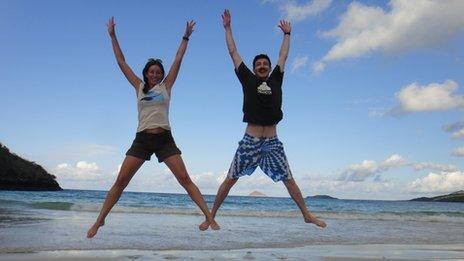'Multiple sclerosis didn't stop me travelling world'
- Published

During his world trip, George stopped off in Australia and Brazil to continue his treatment for MS
If you had told 30-year-old George Pepper, from Leeds, a few years ago that he would travel round the world, he wouldn't have believed you.
That his girlfriend would accompany him and return as his fiancée, was a little less of a surprise - for him at least.
"We were in Florianopolis in Brazil. I'd got the ring beforehand, there was a really nice beach...," he says, voice tailing off as he recalls the romantic proposal.
George's trip was particularly special because he was diagnosed with multiple sclerosis when he was 22.
Getting used to his diagnosis was difficult and the uncertainty of how the condition would progress was frightening.
In the first two years, he had seven relapses. He experienced blurred vision, difficulty walking, vomiting, extreme fatigue and a lack of feeling on his left side.
George has Relapsing Remitting MS, which meant that the symptoms only lasted a number of weeks at a time, but he did have to stop working for several months.
"But I'd always wanted to go travelling. The more I heard about it, the more I wanted to do it," George says.
"I'm quite stubborn. I didn't want to look back and regret anything."
Months of careful planning and years of saving funds followed.

'Alone'
In the meantime he founded a website, <link> <caption>shift.ms</caption> <url href="http://shift.ms/" platform="highweb"/> </link> , for young people with the neurological condition, because he felt alone and isolated in those early days.
A grant from the Wellcome Trust to improve communication between MS researchers and young MS sufferers followed.
As a result, a busy online forum and a real community of friends has now built up around the website, which has become a valuable support network for young people.
Before George set off on his world tour he had another relapse, losing his hearing in one ear for eight weeks. He also had co-ordination issues, kept losing his balance and felt extremely tired.
At the same time it was suggested that he change his treatment from daily drug injections to monthly intravenous infusions - a move which dramatically improved his health.
To maintain this treatment schedule, his doctors in Leeds suggested stopping off at hospitals in Melbourne, Australia, and Sao Paolo, Brazil, to receive the required drugs dose - an arrangement that worked perfectly.
But there were other considerations too.
"I was very nervous about the heat and humidity before we left, a common issue for people with MS.
"So we always planned activities in the early morning or evening - and took lots of drinks breaks.
"And we tried to put in lots of rest days in our itinerary, and paid a bit more for comfier seats on long-distance bus journeys."
'Incredible journey'
After recently returning from his long-awaited six-month journey to places like India, Japan, Indonesia, New Zealand and South America, George is elated by all the things he has done and seen.
"It was incredible. I feel very lucky. I look back and think 'what an experience'."

George travelled through Peru, visiting Machu Picchu
George is just one of more than 100,000 people in the UK who have MS.
Most are diagnosed between the ages of 20 and 40 and yet a new report from the <link> <caption>MS Society</caption> <url href="http://www.mssociety.org.uk/" platform="highweb"/> </link> found that few young people were aware of this fact.
The report surveyed over 1,400 people with MS, and over 2,000 without MS.
Almost one in three people couldn't name any of the common symptoms of MS, which include problems with balance, vision, fatigue, bladder, bowel, speech, memory and muscle spasms.
Simon Gillespie, chief executive of the MS Society says multiple sclerosis is poorly understood, even by those who know people with MS.
"Because it is poorly understood, living with MS can turn a simple shopping trip or social event into an ordeal where strange looks and hurtful remarks can all be part of everyday life."
Social impact
The survey found that more than half of people with MS find it harder to socialise since their diagnosis, with around two-thirds saying their MS has hampered their ability to enjoy everyday social activities.
Yet people with MS want the same things as everyone else, like a successful career and an active social life.
Before his travels, George worked for a marketing agency in Leeds but he has now decided to concentrate full time on <link> <caption>shift.ms</caption> <url href="http://shift.ms/" platform="highweb"/> </link> , and on helping other people achieve their goals.
"There are plenty of people less fortunate than me. I feel fine now. The side effects from the drugs are minimal and I'm getting married next spring."
His condition didn't stop him enjoying a wonderful trip, partly because MS was way down his list of priorities.
There were slow days and tiring days, he admits, and a bout of tonsillitis in New Zealand, but keeping busy was important.
"MS doesn't mean giving up on your ambitions, it just means rethinking how to achieve them," he says.
- Published10 August 2011
- Published16 March 2012
- Published29 July 2011